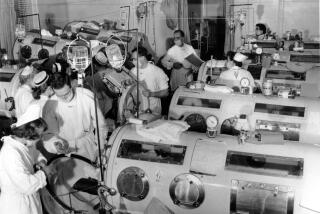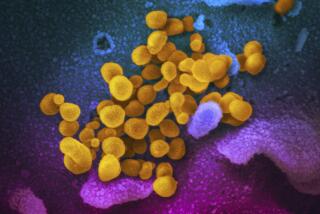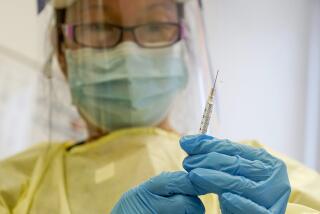Yes, President Trump, there is a difference between HIV and HPV. Here’s a handy tipsheet

In the early days of his presidency, Donald Trump famously declared that “nobody knew that healthcare could be so complicated.”
At the time, he was talking about health insurance. But perhaps he was also thinking about two potentially life-threatening viruses — HIV and HPV.
In a video that came to light this week, Microsoft co-founder Bill Gates described two meetings with Trump where the men discussed a variety of issues related to innovation, science, education and global health.
“Both times, he wanted to know if there was a difference between HIV and HPV,” Gates recounted to staffers of the Bill & Melinda Gates Foundation. “I was able to explain that those are rarely confused with each other.”
(The audience responded with hearty laughter.)
HIV, short for human immunodeficiency virus, wreaks havoc on the immune system. If not kept in check with proper treatment, the virus will rob the body of its ability to withstand infections. HIV can lead to AIDS (acquired immune deficiency syndrome), a condition that makes people vulnerable to opportunistic infections. These infections can be fatal.
HPV (human papillomavirus) is the name for a family of viruses that affect the skin and other organs. More than 150 viruses have been identified, though not all of them are dangerous. About 40 types infect the genital area, including at least 13 that can cause cancer. Some types of HPV produce warts elsewhere on the body, including on the hands, elbows and feet.
For President Trump, and anyone else out there who may be confused, here’s a primer on the difference between HIV and HPV.
Who’s infected?
HIV: More than 1.1 million Americans are infected with HIV.
HPV: About 79 million Americans have an HPV infection.
Do they know?
HIV: About 14% of Americans with HIV don’t know they are infected.
HPV: Most people with HPV don’t know that they’re infected.
What happens if left untreated?
HIV: The virus reduces the immune system’s supply of T cells, making patients vulnerable to opportunistic infections.
HPV: In most cases, an HPV infection clears up on its own. Two types of HPV cause genital warts, which can be uncomfortable but are not dangerous.
How does it spread?
HIV: It can spread through sexual contact or by sharing needles with someone who is infected. A mother can pass HIV to her child during pregnancy, birth or through breastfeeding.
HPV: It spreads through skin-to-skin contact during vaginal, anal or oral sex.
Does it cause cancer?
HIV: People with HIV are more likely to develop certain types of cancer, including Kaposi sarcoma, aggressive B-cell non-Hodgkin lymphoma and cervical cancer.
HPV: About a dozen types of HPV can cause cervical cancer, along with cancers in the vulva, vagina, penis, anus, mouth and throat.
Is there a cure?
HIV: There is no cure for HIV, but it can be kept under control with antiretroviral therapy, or ART.
HPV: There is no treatment for the virus, but there are medicines for the conditions the virus causes.
What about a vaccine?
HIV: There is no vaccine to prevent HIV, though several candidates are in the works.
HPV: There are vaccines to prevent infection with up to nine types of HPV that cause cancer.
What else do I need to know?
HIV: Once a person becomes infected, doctors can’t eliminate all traces of the virus. But patients on ART can have a normal life expectancy. There is no cure for HIV.
HPV: It is the most common sexually transmitted disease, and nearly everyone becomes infected at least once in their lives.
Bonus material: HSV
Now that you’ve mastered the difference between HIV and HPV, you might be interested in a third virus with a similar name — HSV.
Short for herpes simplex virus, HSV comes in two varieties. Both types — HSV-1 and HSV-2 — cause genital herpes, a sexually transmitted disease that afflicts more than 17% of Americans between the ages of 14 and 49. Genital herpes spreads through vaginal, anal or oral sex. Symptoms include itching, pain, small sores or blisters, ulcers and scabs. There is no vaccine or cure, but there are medicines that can shorten an active outbreak or prevent a future one.
HSV-1 also causes oral herpes, which can lead to cold sores or fever blisters in the area of the mouth.
Most people who have either type of HSV don’t realize they are infected because they don’t develop any symptoms.
Follow me on Twitter @LATkarenkaplan and “like” Los Angeles Times Science & Health on Facebook.
MORE IN SCIENCE
A little extra global warming will mean a lot more habitat loss for plants and animals, study says
In a distant galaxy, scientists find oldest oxygen in universe and stars from edge of cosmic dawn
The U.S. birthrate hits another record low. Even women in their 30s are having fewer babies
UPDATES:
11:10 p.m.: This article was updated with additional information about herpes simplex virus, or HSV.
This story was originally published at 2:40 p.m.







